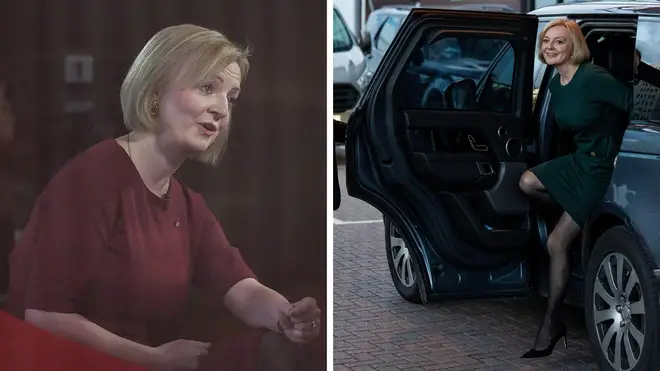
Ian Payne 4am - 7am
2 October 2022, 08:37 | Updated: 7 October 2022, 13:40

Liz Truss has admitted she’s ‘learned’ from the economic fallout sparked by her mini-budget but warned MPs that “status quo” is not an option for the nation’s finances.
She warned Tory rebels urging her to abandon her controversial tax cutting agenda that she will not change course, telling them "the status quo isn't an option".
"I understand their worries about what has happened this week... I do accept we should have laid the ground better...
"I have learned from that and I will make sure that in future we do a better job of laying the ground," she told the BBC.
The Prime Minister rejected calls to sack Chancellor Kwasi Kwarteng after the chaos caused by his mini-budget, insisting he was doing an "excellent job" despite the turmoil on the financial markets caused by his mini-budget.
She arrived in Birmingham for the start of the annual Conservative Party conference as another opinion poll showed Labour with a big lead over the Tories.
In an interview this morning, Ms Truss said she had ‘learned’ lessons from the fallout of the mini-budget and that she would ‘lay the ground better’ next time before making big announcements.
But she stood by all the measures announced, saying “I want to reassure people we have a very clear plan.” “I stand by the package we announced,” she said.
The survey by Opinium, put Labour on 46%, 19 points clear of the Conservatives on 27%. On the issue of the economy it found that a one-point lead for the Tories a week ago had become a 19-point advantage for Labour.

'Every thing that has happened in the last week Rishi Sunak warned of'
It follows a tumultuous week which saw the pound slump to a record low against the dollar and the Bank of England step in to prevent the collapse of the pensions industry in the wake of Mr Kwarteng's £45 billion package of unfunded tax cuts.
With some Tory MPs speculating that she might not last the until the end of the year, Sir Keir Starmer sought to seize on the discontent in the Conservative ranks, urging rebels to work with Labour to defeat the Government's tax plans in the Commons.
Writing in The Daily Telegraph, the Labour leader said it was "unacceptable" that neither the country nor Parliament had had any say on the measures despite the chaos wreaked on the financial markets.
"The economy is not a laboratory experiment for the maddest scientists of the Conservative Party. Mortgages, pensions and family finances are not casino chips for a Government intoxicated by dogma," he said.
"There are many decent Conservative MPs who know this. My message to them is that Labour will work with anyone to ensure some semblance of economic sanity is restored."
But in an interview with The Sunday Telegraph, the Prime Minister said she was sticking to her guns, and that tax cuts were essential to get the economy growing again.
"Change is always something that people might find worrying. But what I'm fundamentally saying is we do have to change, and the status quo isn't an option," she said.
"We cannot continue on the current trajectory of managed decline... We must take a new direction."
Mr Kwarteng admitted he been taken aback by the reaction of the financial markets to his mini-budget.
He told The Mail on Sunday that it had been put together at "very high speed" because of the need to support people with their energy bills, but that he was "100% convinced" it was the right plan.
"It's very difficult to actually anticipate how markets react to anything and if politicians were really good at reading markets, I suggest they probably would be market traders," he said.
"I think what we're seeing now is more stability and I'm hopeful that we can build on that."
Ms Truss disclosed that the first of the Government's supply-side reforms, intended to support the growth plan, will be extending exemptions for small businesses from firms with up to 250 employees to those with up to 500.
She said the change would release an additional 40,000 firms from red tape and making it "easier for them to get on with their business".
The Telegraph said she was also working on the creation of new "childminder agencies" under a French-style system to cut the cost of childcare.
Her intervention came amid reports of letters going in to the chairman of the backbench Conservative 1922 Committee, Sir Graham Brady, from Tory MPs calling for a vote of no confidence in her.
While under current rules she is protected from a leadership challenge for a year from her election, the 1922 executive has the power to change those rules should the demand for a contest become overwhelming.
Meanwhile a number of senior figures - including Ms Truss's defeated leadership rival Rishi Sunak and former cabinet ministers Priti Patel, Sajid Javid and David Davis - are reportedly staying away from the conference.
South Suffolk MP James Cartlidge became the latest backbencher to criticise the Chancellor's plans, saying that while change was needed, reducing benefits while cutting taxes for top earners in a cost-of-living crisis was "unacceptable".
"This does not mean that, having lost market support for proposed unfunded tax measures, we try to win that support anew with on-the-back-foot, un-pitch-rolled cuts to benefits when the cost of food and staples is rocketing, whilst keeping a tax cut for the wealthiest," he tweeted.
However former foreign secretary Jeremy Hunt, who backed Rishi Sunak for the leadership, said that Ms Truss should be given a fair chance for her plan to work.